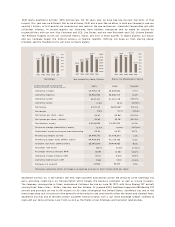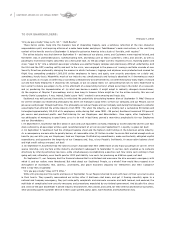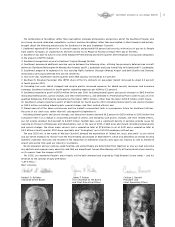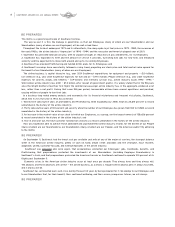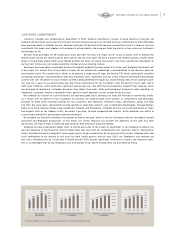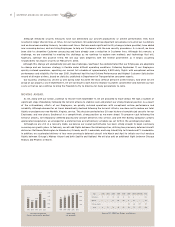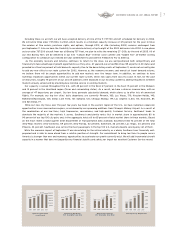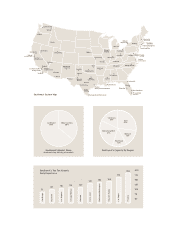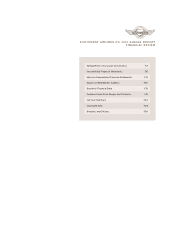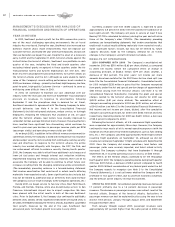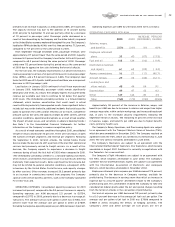Southwest Airlines 2001 Annual Report Download - page 10
Download and view the complete annual report
Please find page 10 of the 2001 Southwest Airlines annual report below. You can navigate through the pages in the report by either clicking on the pages listed below, or by using the keyword search tool below to find specific information within the annual report.
MANAGEMENT’S DISCUSSION AND ANALYSIS OF
FINANCIAL CONDITION AND RESULTS OF OPERATIONS
YEAR IN REVIEW
In 2001, Southwest posted a profit for the 29th consecutive year in
one of the most challenging operating environments the air travel
industry has ever faced. During the year, Southwest also increased our
domestic market share, made enhancements that will improve our
Customer Service, and ended the year with more Employees and aircraft
than we had when we began the year. Despite the onset of a recession
early in 2001 and the September 11, 2001, terrorist attacks against the
United States (the terrorist attacks), Southwest was profitable in each
quarter of the year, including the third and fourth quarters after
excluding federal grants recognized in these quarters under the Air
Transportation Safety and System Stabilization Act (the Act). (See
Note 3 to the Consolidated Financial Statements for further details on
the terrorist attacks and the Act.) Although we were unable to match
some of the Company’s record-setting performance levels reached in
2000, our business strategy — primarily shorthaul, high frequency, low-fare,
point-to-point, high-quality Customer Service — continued to serve us
well during some difficult times in 2001.
In 2001, we continued to maintain our cost advantage over our
industry while the recession and events of September 11 put downward
pressure on revenues. In response to uncertainties following
September 11 and the precipitous drop in demand for air travel,
Southwest amended its agreement with The Boeing Company to defer
aircraft deliveries (see Note 4 to the Consolidated Financial
Statements) but did not ground airplanes, reduce service, or furlough
Employees. Following the temporary FAA shutdown of U.S. air space
after the terrorist attacks, load factors have steadily improved to
somewhat normal, average historical levels. However, these load factors
have resulted from significant fare discounting, which continues to
result in year-over-year declines in passenger revenue yields per RPM
(passenger yields) and operating revenue yields per ASM.
As we begin 2002, in addition to the difficult revenue environment for
commercial airlines, the Company is faced with increased war risk insurance
and passenger security costs resulting from continually evolving security
laws and directives. In response to the terrorist attacks, the airline
industry has worked diligently with Congress, the DOT, the FAA, and
law enforcement officials to enhance security. During fourth quarter
2001, the Company was able to offset these additional costs because of
lower jet fuel prices and through internal cost reduction initiatives
implemented following the terrorist attacks. However, there can be no
assurance the Company will be able to continue to offset future cost
increases resulting from the changing commercial airline environment.
(The immediately preceding sentence is a forward-looking statement
that involves uncertainties that could result in actual results differing
materially from expected results. Some significant factors include, but
may not be limited to, additional laws or directives that could increase
the Company’s costs or result in changes to the Company’s operations, etc.)
During 2001, we began service to two new cities, West Palm Beach,
Florida, and Norfolk, Virginia, while also discontinuing service to San
Francisco International Airport due to airport congestion. We have
been pleased with the initial results in both of the new Southwest
cities. Prior to September 11, the Company also continued to add flights
between cities already served. Southwest ended 2001 serving 58 cities in
30 states. Immediately following the terrorist attacks, Southwest suspended
fleet growth. However, by the end of the year, Southwest had
announced plans for modest growth to resume in early 2002.
Currently, available seat mile (ASM) capacity is expected to grow
approximately 3.5 percent in 2002 with the planned net addition of at
least eight aircraft. The Company will place in service at least 11 new
Boeing 737-700s scheduled for delivery during the year and will retire
three of the Company’s older 737-200s. (The immediately preceding
sentences are forward-looking statements that involve uncertainties that
could result in actual results differing materially from expected results.
Some significant factors include, but may not be limited to, future
capacity decisions made by the Company, demand for air travel,
changes in the Company’s aircraft retirement schedule, etc.)
RESULTS OF OPERATIONS
2001 COMPARED WITH 2000 The Company’s consolidated net
income for 2001 was $511.1 million ($.63 per share, diluted), as compared
to 2000 net income, before the cumulative effect of change in
accounting principle, of $625.2 million ($.79 per share, diluted), a
decrease of 18.2 percent. The prior years’ net income per share
amounts have been restated for the 2001 three-for-two stock split (see
Note 11 to the Consolidated Financial Statements). Consolidated results
for 2001 included $235 million in gains that the Company recognized
from grants under the Act and special pre-tax charges of approximately
$48 million arising from the terrorist attacks (see Note 3 to the
Consolidated Financial Statements). Excluding the grant and special
charges related to the terrorist attacks, net income for 2001 was
$412.9 million ($.51 per share, diluted). The cumulative effect of
change in accounting principle for 2000 was $22.1 million, net of taxes
of $14.0 million (see Note 2 to the Consolidated Financial Statements).
Net income and net income per share, diluted, after the cumulative
change in accounting principle, for 2000 were $603.1 million and $.76,
respectively. Operating income for 2001 was $631.1 million, a decrease
of 38.2 percent compared to 2000.
Following the terrorist attacks, all U.S. commercial flight operations
were suspended for approximately three days. However, the Company
continued to incur nearly all of its normal operating expenses (with the
exception of certain direct trip-related expenditures such as fuel, landing
fees, etc.). The Company cancelled approximately 9,000 flights before
resuming flight operations on September 14, although we did not
resume our normal pre-September 11 flight schedule until September 18,
2001. Once the Company did resume operations, load factors and
passenger yields were severely impacted, and ticket refund activity
increased. The Company estimates that from September 11 through
September 30, it incurred operating losses in excess of $130 million.
The effects of the terrorist attacks continued to be felt throughout
fourth quarter 2001. The Company’s operating income during fourth quarter
2001 was $37.1 million, a decrease of 85.2 percent compared to fourth
quarter 2000. Without consideration of any federal grant under the Act
the Company expects to recognize (see Note 3 to the Consolidated
Financial Statements), it is not yet known whether the Company will be
profitable in first quarter 2002, due to uncertain economic conditions
and the difficult airline industry revenue environment.
OPERATING REVENUES Consolidated operating revenues decreased
1.7 percent primarily due to a 1.6 percent decrease in passenger
revenues. The decrease in passenger revenues was a direct result of the
terrorist attacks. Because of the terrorist attacks, fluctuations in
passenger revenue can best be explained by discussing the year in two
distinct time periods: January through August 2001, and September
through December 2001.
From January through August 2001, passenger revenues were
approximately 8.7 percent higher than the same period in 2000 due
SOUTHWEST AIRLINES CO. 2001 ANNUAL REPORT
F2

